Insights
Two Truths and a Lie: TikTok, Texting & Entitlement in the PNW Gen Z Workforce
Employers are currently balancing an increasingly multicultural and multigenerational workplace. As Gen Z, defined as those between 9 and 26 years old, enters and progresses in the workforce, there is much interest in understanding this generation’s career aspirations and desired workplaces.
Like all new generations that begin to shape our culture, Gen Z has sparked many strong opinions.
For example, in a 2023 DHM Research survey, Oregonians of all ages were asked how they felt about different generations. Across generations, Gen Z was rated most negatively; from Baby Boomers to Millennials, and even among Gen Z themselves, less than 50% felt positive about Gen Z. When asked to share words or phrases they associate with Gen Z, some of the top responses were “entitled,” “spoiled” and “disrespectful.”
Quinn Thomas and DHM Research launched an in-depth study across Washington and Oregon to ask Gen Z directly how they view the future and how they approach work. What we found didn’t always square with the negative perceptions in the overarching cultural narrative.
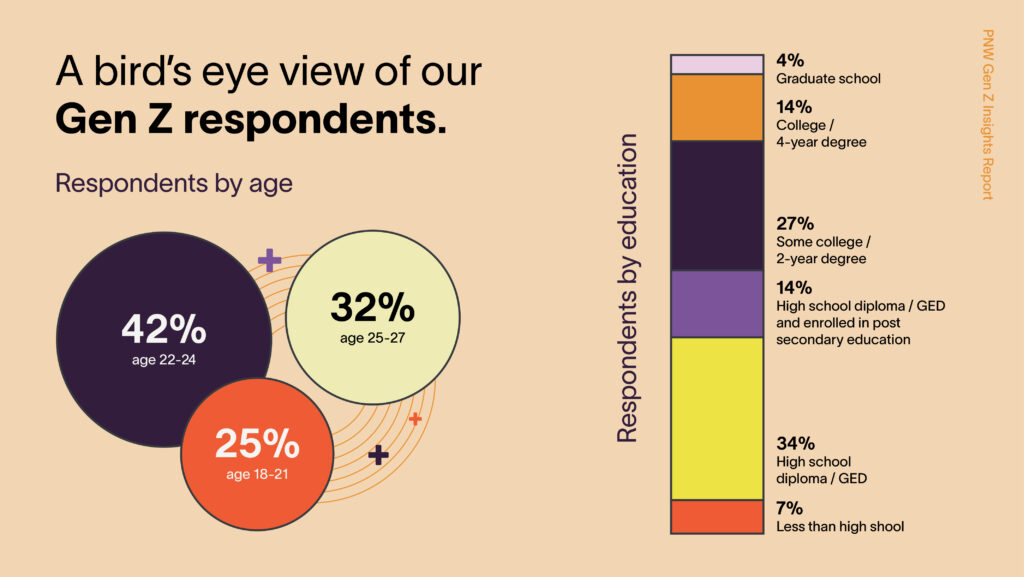
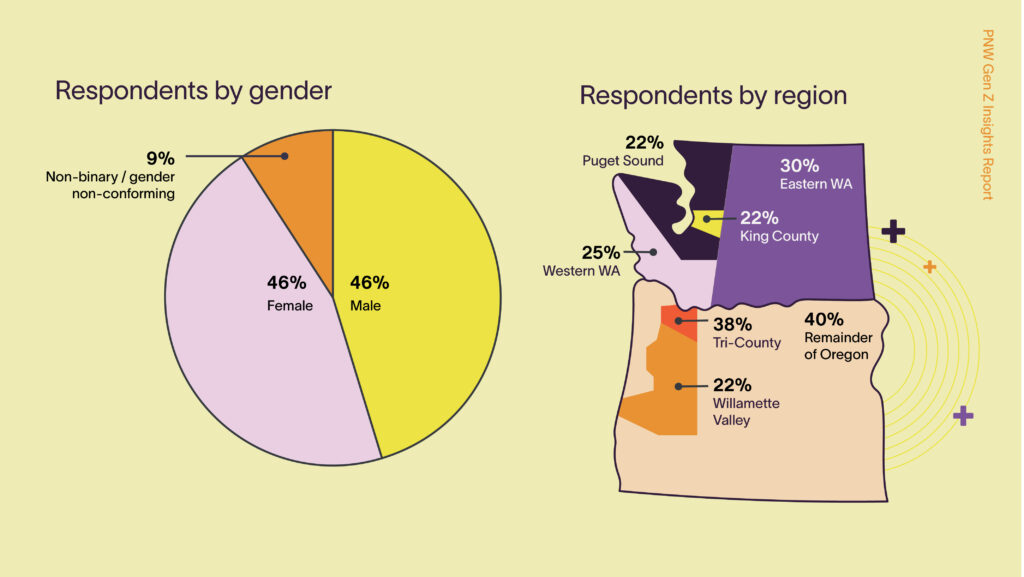
Gen Z is optimistic about their future in the Pacific Northwest but worries about their personal financial situation and how they’ll achieve the future they envision. They value balance in their personal and professional lives and prioritize mental health more than ever. But this doesn’t mean they aren’t willing to work hard to meet their career goals.
Our research provides some context for employers to consider as they recruit, retain and engage Gen Z workers across industries.
Gen Z is optimistic – but concerned about their financial future
To understand how Gen Z approaches their careers, we needed a broader understanding of their goals. Research confirmed a sense of economic uncertainty that many are experiencing: 69% of Gen Z respondents are worried about their financial situation, and 18% are concerned they will never be able to retire. This trends slightly higher than when we’ve explored similar topics with the general population. Interestingly, there was a significant gap among gender lines. 75% of women expressed worry, compared to 60% of men.
The Pacific Northwest is an appealing place to work for young job seekers; however, the cost of living is rising yearly, which can be a driving factor for financial worries.
Only 38% of respondents feel they can buy a home in the next 4-7 years, compared to 41% who think this goal will take 8-10 years to achieve. Further, when they are ready to buy a home, only 43% of Gen Z respondents felt confident they could afford a home in the neighborhood where they would prefer to live. As Gen Z plans their family life, the highest percentage of respondents (29%) said they would have children in 1-5 years and nearly a quarter (24%) plan to in 5-10 years. 22% do not intend to have children, and 13% are undecided.
Uncertainty and instability can drive how Gen Z is assessing their career options in our region and what they prioritize as they look ahead.
Majority of Gen Z experiences anxiety – and looks to their workplaces for mental health resources
Another factor impacting Gen Z at work is mental health and well-being. The research found that 62% have felt nervous, anxious, or on edge five or more times in the past two weeks, 58% have had trouble relaxing, and 48% have felt down, depressed, or hopeless. These rates appear to be higher than national averages for Gen Z according to research from the CDC.
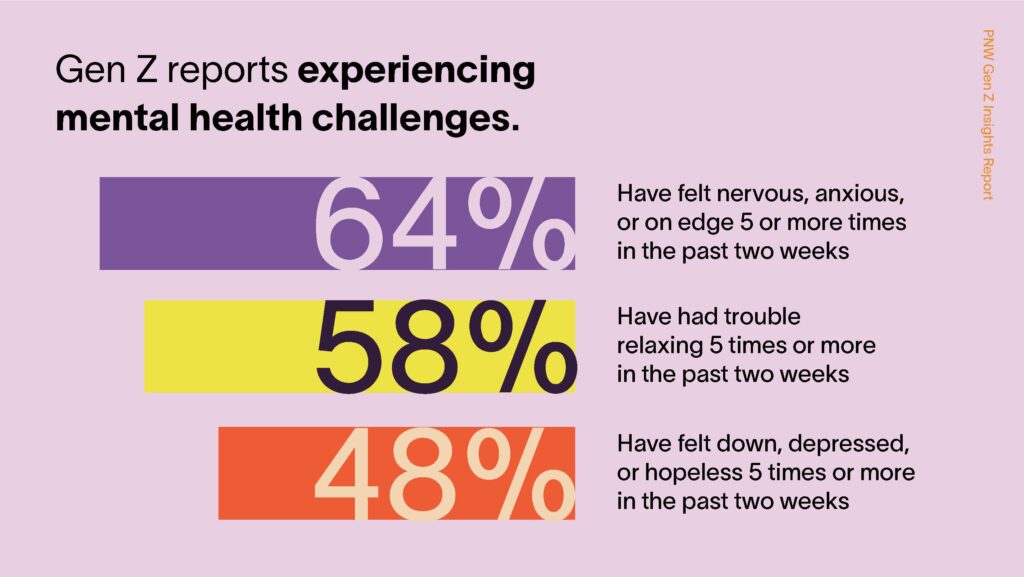
Nationally, we also see this generation is significantly more likely (27%) than other generations, including millennials (15%) and Gen Xers (13%), to report their mental health as fair or poor. They are also more likely, along with millennials (35%), to report receiving treatment or therapy from a mental health professional.
In the past, employees may have addressed these issues at home rather than considered them a topic for the workplace. But Gen Z has a different point of view.
- 79% say workplaces have a responsibility to provide mental health support
- 86% say that it is important to have a manager who cares about their well-being
Managers and employers who can empathize and highlight ways they support their teams will be better positioned with Gen Z employees addressing increased mental health challenges.
Concerns about lack of engagement and desire for leadership are exaggerated
As trends like “quiet quitting” dominate social feeds and news cycles, the narrative about Gen Z is that they are less engaged and focused on work. However, our research shows that these claims don’t tell the whole story – and may drive unnecessary tension.
It’s true that Gen Z is intentional about work/life balance. A solid third (37%) will work overtime if it means achieving a leadership position and career advancement. However, nearly half of respondents (49%) say they work hard during their regular 40 hours but prioritize protecting their work/life balance.
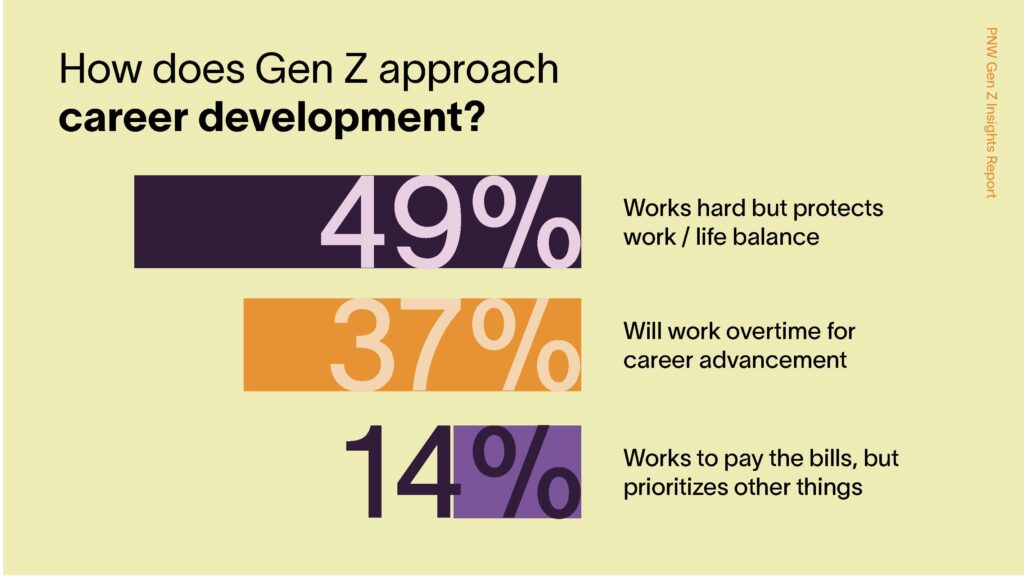
Looking at the longer term, a majority (54%) say they want to earn enough to be financially independent but aren’t interested in leadership. But, again, a solid third (35%) want to advance into a leadership position. Priorities may shift over time, but this still indicates a strong desire from many Gen Z participants to advance to leadership roles and a commitment to contributing, even for those less focused on moving up the ladder.
Further, 84% of working Gen Z surveyed say they are engaged at their current job. Gallup’s 2023 annual benchmark survey found that 18% of workers are actively disengaged with their work. Only 2% of respondents in our Gen Z research said they were actively disengaged.
Engagement is top of mind as employers publicly navigate return to-work policies. However, Gen Z appears ready to return to work. 41% of participants say they’d prefer a primarily in-person work environment and 37% prefer hybrid, compared to only 22% interested in being fully remote.
Show Gen Z the money – and who they’ll work with
An evolving recruitment and retention landscape, including high turnover rates and hesitancy amid economic uncertainty, has challenged employers in the PNW and beyond. Engaging Gen Z is a top priority for many employers seeking to grow and maintain their workforce.
Healthcare, technology, education and social services are some of the most appealing industries to Gen Z participants, indicating interest in socially-driven career paths. Gen Z also has a strong entrepreneurial streak, with a quarter interested in owning their own business. Conversely, our research found that manufacturing, a sector struggling to recruit and train the next generation of its workforce, may not see much relief from Gen Z. Only 15% of respondents identified it as an appealing career sector for them.
While Gen Z may be considered more socially-conscious than other generations, they are not sacrificing their personal well-being when considering career priorities. Earning a good salary (83%) was the most crucial factor when choosing a place to work, followed by:
- Doing a job I can be proud of (75%)
- Being with people I respect (75%)
- Having fun (71%)
Gen Z considers factors like contributing to society (64%) and commitment to DEI (60%) important, but not a top priority.
Understanding motivators can help employers better frame their culture and the opportunities that speak to Gen Z. There is strong interest in a positive environment, but most important is providing competitive salaries and a sense of satisfaction in their role.
When connecting with Gen Z, thinking beyond traditional recruiting channels is essential. Unsurprisingly, 55% say social media is their preferred way to consume news and information, followed (not closely) by news apps or websites (15%) and search engines (10%). In another challenging sign for traditional news sources, only 6% of Gen Z respondents say they get their news from TV. While this number may tick up moderately over time, more likely is their consumption habits persist into the future.
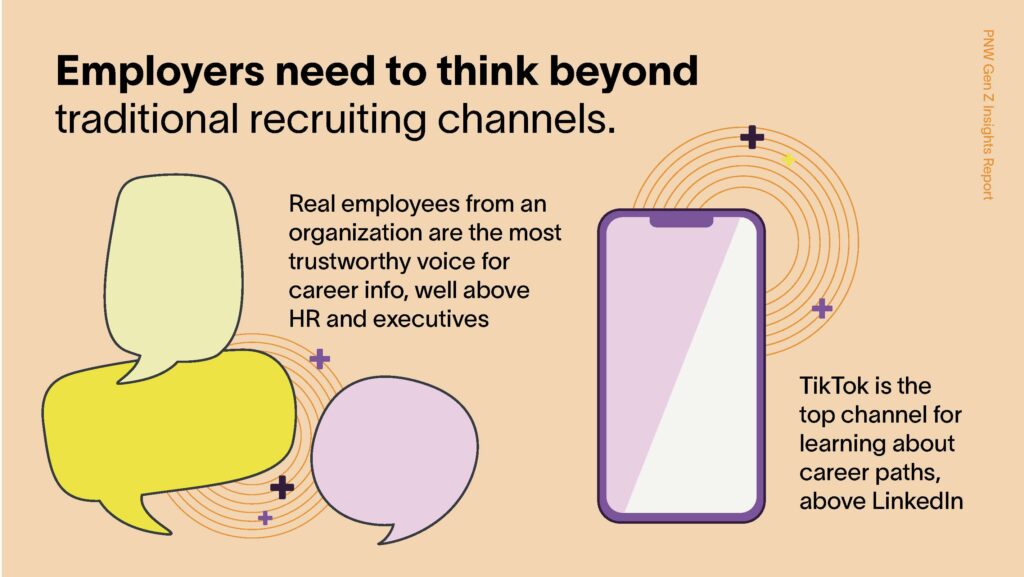
Gen Z is also shifting from some of the more traditional career resources other generations leverage. TikTok is their top channel for learning about career paths (28%), well above LinkedIn (16%). Gen Z job seekers are also more likely to use Indeed (48%) and LinkedIn (22%) to find and apply for jobs rather than a company’s direct website (18%).
Given this focus on social media, there is an opportunity to better leverage employees as ambassadors. 61% of Gen Z employees say actual employees from a company or organization are the most trustworthy voice for career info, well above HR and executives.
Meeting Gen Z where they are online with the types of voices they respond to is a powerful way to strengthen your recruiting strategy.
What does this mean?
Engaging Gen Z effectively requires a more nuanced understanding of employees’ priorities and points of view. The youngest generation in the workplace is particularly susceptible to the financial uncertainty and concerns about the future that many are experiencing, as they make big decisions about where to live, whether to start a family, and more. Here are three top things to keep in mind for the Gen Z workforce.
- While Gen Z is interested in factors that drive workplace culture, employers need to reassure them of financial stability, especially in high cost of living locations like the PNW. A commitment to work/life balance and development opportunities are also top priorities. Employers should leverage interest in return to work as opportunities for networking, skills development and community building.
- Managers should prepare for more conversations and a sense of openness about mental health in the workplace. As part of these conversations, employers must equip managers with an understanding of company resources, employee assistance programs (EAPs) and health care benefits so they can serve as trusted allies.
- Recruitment marketing campaigns must go beyond the traditional channels and voices, which may be totally bypassing Gen Z. Recent Quinn Thomas campaigns for Build Oregon and the Washington Health Care Authority have included real workers, as well as a dedicated TikTok strategy. The research shows your existing workforce can be your best allies in your recruiting and retention efforts if you empower them to share authentic experiences with their peers; something we have also validated in recent years through campaign performance metrics.
Developing a more holistic understanding of Gen Z and looking beyond the predominant narrative can help organizations develop more impactful recruiting and retention strategies and build longer-term, trusted relationships.
Webinar
On October 17, Quinn Thomas and DHM presented this report in a virtual webinar.
Methodology
From June 2 to 6, 2023, DHM Research conducted a survey of Gen-Z (ages 18-27) residents in Washington and Oregon. The purpose of the survey was to better understand the values and sentiments of Washington and Oregon residents between the ages of 18 and 27. Specifically, respondents were asked about general sentiment, jobs and work, personal and economic outlook, mental health and wellbeing, and communication preferences. The hybrid (online and text-to-online) survey consisted of 601 residents of both states. Quotas were set by age, state, gender, education level, and race to ensure a representative sample of the Gen-Z population in the Pacific Northwest.
About Quinn Thomas
Quinn Thomas is an award-winning marketing communications and brand strategy agency founded in 2009. The agency is committed to thorough, audience-focused research and using it as the foundation for approaching every new communications challenge. The agency has offices in Seattle and Portland and has extensive experience in higher education, healthcare, energy and real estate.
About DHM Research
DHM Research has been providing opinion research and consultation throughout the Pacific Northwest and other regions of the United States for over 40 years. The firm is nonpartisan and independent and specializes in research projects to support public policy making.
